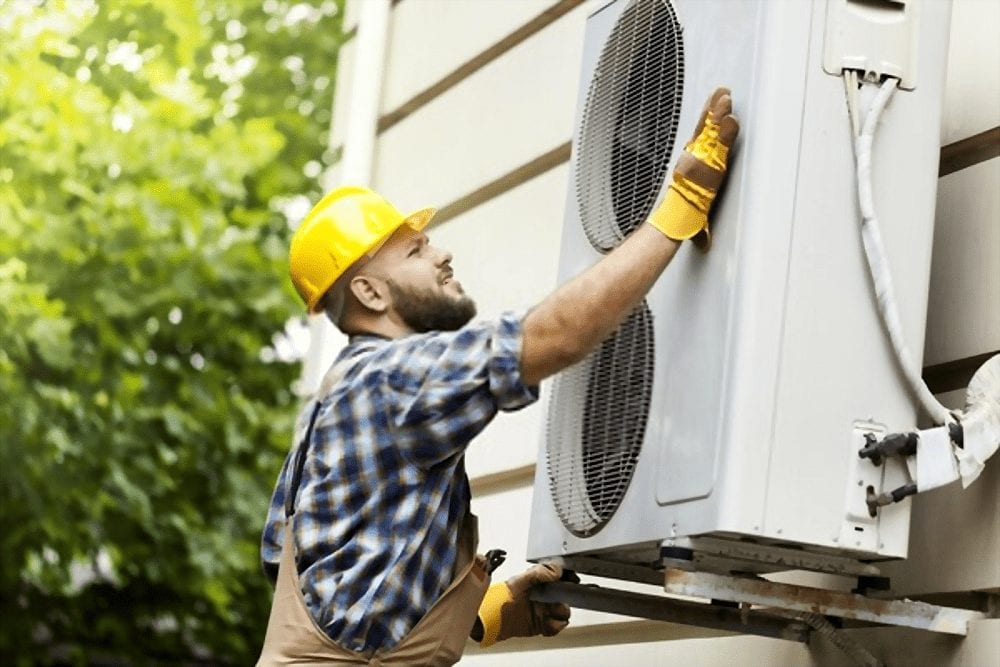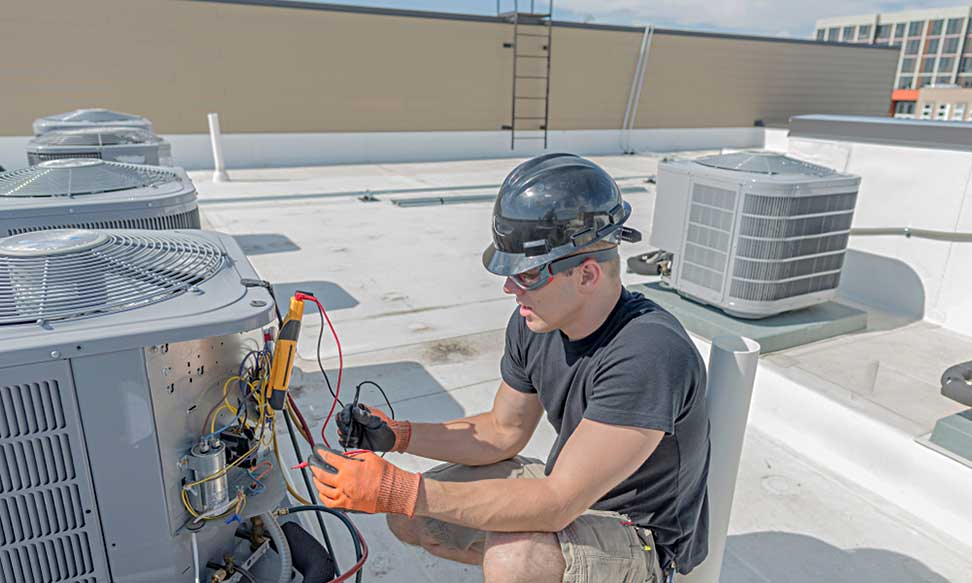Selecting In Between a Warm Pump and Heater: Secret Factors To Consider for Your Cooling And Heating Demands
When examining home heating alternatives for heating and cooling requires, the decision between a heat pump and a furnace can be complex. Each system provides unique advantages customized to certain climates and energy performance goals. Recognizing these differences is vital for making an informed selection. Trick elements such as installment prices and ecological effect better make complex the selection procedure. Which alternative genuinely straightens with one's comfort and sustainability preferences? The adhering to sections will explore these factors to consider thoroughly.
Recognizing Warmth Pumps: How They Function and Their Benefits
While numerous homeowners take into consideration various home heating options, comprehending exactly how heatpump feature and their benefits can greatly influence their choice. Warm pumps run by transferring warm instead of creating it. In the winter season, they remove warmth from the outside air or ground and transfer it inside, while in the summertime, they reverse this procedure, cooling the home by removing warm outside. This dual performance makes them functional for year-round climate control.One of the primary benefits of heatpump is their power performance. They use substantially much less electrical power compared to traditional heating unit, potentially leading to reduced energy costs (heat pump replacement ooltewah tn). Additionally, heatpump have a smaller sized carbon footprint, making them an eco-friendly selection. They likewise require less upkeep than standard systems, adding to long-lasting expense financial savings. In general, understanding the auto mechanics and advantages of warm pumps can assist property owners make notified decisions regarding their heating and cooling needs
Discovering Heaters: Kinds, Procedure, and Advantages
Furnaces are available in numerous kinds, including gas, electric, and oil models, each with distinctive functional systems. Comprehending these differences is essential, as they influence performance and home heating efficiency. Furthermore, furnaces offer many advantages, such as constant heat result and integrity in chillier climates.
Sorts of Furnaces
Heating systems can differ significantly in design and procedure, with heating systems being a prominent selection amongst house owners. There are numerous kinds of furnaces, each utilizing various gas resources and modern technologies. Gas furnaces are typical, leveraging gas to generate heat effectively. Electric furnaces, on the other hand, use electric resistance to create warmth, often preferred for their straightforward installment. Oil furnaces, while much less common, work in locations with minimal gas gain access to (heat pump installation ooltewah tn). Additionally, condensing heaters make best use of energy efficiency by reusing and recording exhaust gases. Each type runs with a system of warmth exchangers and ductwork to distribute warm air throughout a home. Understanding the differences in between these heater types is vital for educated cooling and heating choices
Advantages of Heaters
For homeowners looking for dependable warmth throughout cold months, the advantages of heating systems are significant. Heating systems give consistent heating, making sure also temperature levels throughout the home. They are specifically effective in extreme chilly, commonly outperforming heatpump in icy conditions. Numerous kinds, including gas, electrical, and oil heaters, use flexibility to fulfill diverse demands and preferences.Furnaces additionally tend to have lower initial setup costs compared to heatpump, making them an extra accessible alternative for lots of. Their robust design adds to a longer life expectancy, with many devices lasting over 15 years with correct maintenance. Additionally, modern furnaces are often furnished with sophisticated innovation for boosted performance, which can bring about lowered power costs. Generally, heating systems stay a reputable selection for efficient home heating.

Power Efficiency: Contrasting Heat Pumps and Furnaces
When comparing power effectiveness in between warm pumps and heating systems, the Seasonal Power Effectiveness Ratio (SEER) plays a necessary function in establishing efficiency. In addition, a functional cost analysis discloses the long-lasting monetary implications of each system. Comprehending these elements can lead home owners in making informed decisions concerning their home heating remedies.
Seasonal Energy Effectiveness Proportion
Energy efficiency plays a necessary duty in the decision-making procedure in between warmth pumps and furnaces, particularly when considering the Seasonal Power Performance Proportion (SEER) This statistics measures the cooling efficiency of heat pumps over an entire cooling season, offering a standardized way to assess performance. Higher SEER scores suggest higher power effectiveness, converting to lower power usage and minimized energy costs. On the other hand, furnaces are typically analyzed using the Yearly Gas Usage Efficiency (AFUE) score, which mirrors home heating performance. When contrasting these two systems, homeowners need to focus on SEER rankings for heatpump, as they straight influence total energy cost savings and environmental sustainability. A detailed understanding of SEER can significantly influence the long-term complete satisfaction and cost-effectiveness of the picked heating and cooling service.
Operational Cost Evaluation
Understanding the functional costs related to heatpump and heating systems is essential for homeowners assessing their choices. Heatpump commonly offer higher power performance, converting electric energy right into heat with very little waste. This leads to reduced month-to-month utility bills, especially in modest climates. Conversely, typical heaters, specifically gas versions, might have reduced ahead of time costs however can sustain greater operational costs over time due to fuel prices and effectiveness ratings.Moreover, heatpump can work as both home heating and cooling systems, potentially minimizing the demand for different cooling and heating devices. While first financial investments for warmth pumps might be greater, their lasting savings in power efficiency can make them a much more cost-efficient option for lots of homes. Mindful evaluation of regional energy rates is necessary to establish the best choice.
Installment Expenses: What to Expect for every Heating System
Installment costs for home heating systems can vary substantially in between heatpump and heating systems, affecting home owners' choices. Warmth pumps usually have greater upfront installation costs, normally varying from $3,500 to $8,000, relying on the device dimension and intricacy of installment. This consists of the outside device, interior handling system, and essential ductwork alterations. Alternatively, heaters often tend to have lower first expenses, averaging in between $2,500 and $6,000, which can be appealing for budget-conscious property owners. Nonetheless, setup costs can boost if considerable ductwork is required.Moreover, the choice of gas type for heating systems-- gas, lp, or electrical-- can also influence setup expenses. While heatpump offer power effectiveness, their initial investment might prevent some buyers. Inevitably, assessing installation expenses alongside lasting cost savings and performance will assist property owners in making educated decisions regarding their heating unit.
Environment Considerations: Which System Executes Much Better in Your Area
Just how do climate conditions affect the efficiency of home heating systems? The efficiency of heatpump and furnaces can differ significantly depending upon the regional climate. In moderate climates, heatpump excel by successfully moving heat from the outside air, making them an energy-saving alternative. Their efficiency lessens in incredibly chilly temperature levels, where they might struggle to draw out adequate warmth. Alternatively, furnaces, specifically gas designs, supply regular and reliable warmth despite outside conditions, making them more suitable in chillier regions.In areas that experience milder winters months, heatpump can operate successfully year-round, giving both heating & cooling. In comparison, regions with severe winters months commonly gain from the robustness of furnaces. Inevitably, comprehending the local environment is necessary when determining between a heatpump and a heater, as it directly impacts their functional efficiency and total performance.
Upkeep Requirements: Long-Term Treatment for Warmth Pumps vs. Furnaces
While both heatpump and Visit This Link heaters need routine maintenance to assure peak performance, their particular needs and treatment routines vary substantially. Heaters commonly need much less regular attention, with yearly evaluations being sufficient to look for gas leaks, clean filters, and analyze general functionality. Their easier style often permits for simple repairs.In contrast, heatpump require semiannual upkeep due to their double role in home heating and air conditioning. This includes cleansing coils, inspecting cooling agent degrees, and making certain that both the outside and indoor units operate at their ideal. Furthermore, warmth pump maintenance usually includes even more elaborate elements, making specialist servicing essential.Neglecting upkeep can bring about reduced efficiency and boosted power expenses for both systems. Ultimately, home owners ought to think about these long-lasting treatment needs when choosing in between a heat pump and a heating system, as positive upkeep can expand the life-span and efficiency of either system significantly.
Environmental Effect: Picking a Lasting Heating Choice
The ecological influence of heating unit is an important analysis for homeowners seeking lasting options. Heatpump are normally more energy-efficient than conventional furnaces, as they move heat instead than generate it, substantially minimizing carbon discharges. By making use of renewable resource resources, such as air-source or geothermal warm pumps, house owners can even more reduce their eco-friendly footprint.On the various other hand, gas furnaces give off greenhouse gases and add to air pollution, though they commonly give greater warm output. Improvements in modern technology have actually led view it now to the development of high-efficiency heaters that lessen emissions.Ultimately, picking a heating system entails evaluating effectiveness against ecological impact. Homeowners are encouraged to mirror on regional power sources and incentives for eco-friendly systems, guaranteeing a selection that straightens with both personal comfort and ecological duty. The decision impacts not only instant convenience but likewise lasting sustainability and ecological wellness.
Regularly Asked Questions
For How Long Do Warmth Pumps and Furnaces Normally Last?
The life expectancy of heatpump usually ranges from 15 to twenty years, while furnaces can last between 15 to 30 years. Regular upkeep substantially affects their longevity and performance in providing home heating solutions.
Can I Utilize a Heat Pump in Extremely Cold Climates?
Warmth pumps can run in incredibly cold environments, however their effectiveness diminishes as temperature levels drop. In such conditions, extra heating resources might be essential to keep comfy indoor temperature levels and guarantee peak efficiency.

What Is the Sound Degree of Warmth Pumps Versus Furnaces?
The sound levels of heatpump and heating systems vary substantially. Normally, heatpump run even more quietly than traditional heaters, making them more suitable for those conscious appear, while heating systems may produce louder operational sounds during home heating cycles.
Are Heat Pumps Suitable for Both Home Heating and Cooling?
Warmth pumps are indeed appropriate for both cooling and heating (ductless mini splits). They function by moving heat, supplying reliable temperature level control year-round, making them a versatile choice for property owners looking for an all-in-one a/c solution
What Size Heater Do I Need for My Home?
Establishing the appropriate dimension heater for a home calls for assessing elements such as square video footage, insulation quality, neighborhood environment, and the home's design. Consulting an expert can guarantee an exact analysis and suitable comfort. Heat pumps commonly supply higher energy effectiveness, transforming electric energy right into warmth with marginal waste. In modest climates, warm pumps succeed by successfully moving warmth from the outside air, making them an energy-saving option. On the other hand, heaters, particularly gas models, supply trusted and consistent heat no matter of exterior problems, making them better in cooler regions.In address areas that experience milder wintertimes, warmth pumps can operate properly year-round, giving both home heating and air conditioning. Heat pumps are normally a lot more energy-efficient than typical heaters, as they transfer warm instead than generate it, greatly reducing carbon emissions. By making use of sustainable power resources, such as geothermal or air-source warm pumps, property owners can additionally decrease their environmental footprint.On the other hand, natural gas furnaces produce greenhouse gases and add to air contamination, though they commonly supply greater warmth result.